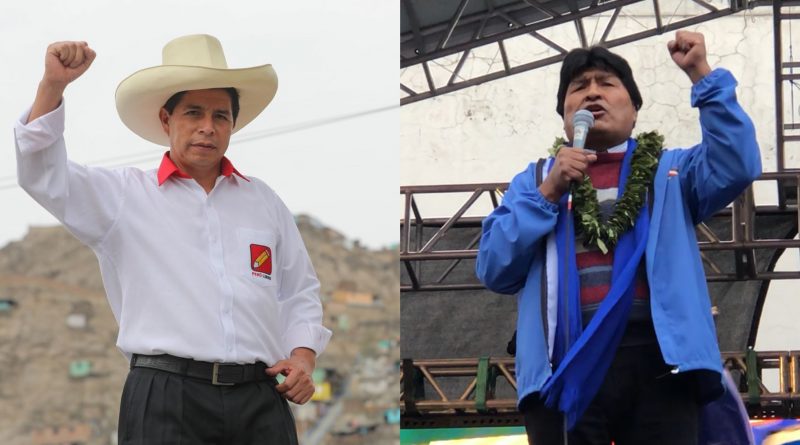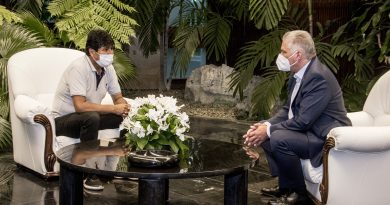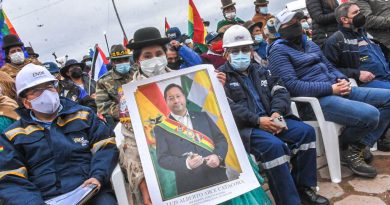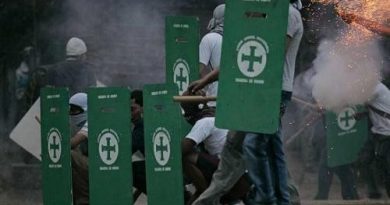Evo: “Pedro Castillo Won with Proposals of the MAS”
Evo Morales has praised the electoral victory of Pedro Castillo, who came first in Peru’s presidential election, and has said that Castillo’s successful proposals are the same as those that the Movement Towards Socialism (MAS) won with in Bolivia.
“For the first round, a teacher, Pedro Castillo, has won with our proposals. I once spoke by phone with the presidential candidate, he won with 16% (despite that) he did not appear in the polls before, but yesterday he surprised everyone,” said Evo, at a union meeting in Shinahota, Trópico of Cochabamba, the day after the vote in Peru.
Commenting on Castillo’s proposals, Morales stated, “(Pedro Castillo) said: If I am President, ‘I’m going to lower my salary,‘ which we did in Bolivia; second, he said ‘I am going to guarantee the Constituent Assembly to re-found Peru,’ which was our proposal; third, ‘I am going to nationalize mining and hydrocarbons’ that is our proposal.. we export our politics which come from the social movements.”
On April 15th at 3:46am, 99.95% of votes had been counted by electoral authorities. Pedro Castillo outperformed the exit poll, having received 19.1% of votes. In second place, is far-right candidate Keiko Fujimori with 13.3%. The two will face off in the second round, which must be held 30 days after the completion of the first round vote count.
Fernando López Ariñez, international political analyst based in La Paz, spoke to Kawsachun News to contextualize the political situation in Peru.
“Something positive that we must recognize in Peru is that the election won’t be between two faces of the right. This will be between, most likely, Keiko Fujimori and Castillo. Keiko Fujimori, the daughter of Alberto Fujimori, a key figure in Peru neoliberalism, and on the other side, Castillo, a union leader with a short political career but who has been able to lay down certain ideas when voters (needed it most). So we are going to see a clash of ideas as we’ve also seen in Ecuador, as has happened in Bolivia and other parts of the region and we’ll have to see what happens and what’s most important to Peruvians.
Obviously, there’s going to be a campaign of fear against Castillo, they’re going to accuse him of being a leftist extremist who could ruin all of Peru’s development. We’ll have to see if the people believe it, and on the other hand, see if they’ll accept the return of Fujimorismo which left power in a very tragic way. We have the former President [Alberto Fujimori] jailed for violations of human rights, for cases of corruption, and a lot of things which are the first things that anyone thinks about with regards to Fujimorismo. So Peru is going to be very interesting, but also shows a society that is totally politically fragmented. We have a Congress which is very divided, and so it won’t be a problem of governability, so much as a problem of survival, knowing that the Peruvian Congress in recent years has tried to get rid of the Executive when it comes in the way of its interests. And if any of these actors, especially Castillo, wish to apply measures upon being elected President, there will be a strong resistance now that there are certain sections of the right that can create problems.”
López Ariñez adds that the shock election result on Sunday is the product of a long social crisis of neoliberalism: “The Peruvian model has been sold to many other countries of the region because Peru grew at very high rates, all linked to the sale of raw materials, gold more than anything. But that growth never spilled over [to the rest of society]. That growth remained in certain sectors of Peruvian society, and what the pandemic did was undress all the errors of the Peruvian model and show us that there wasn’t much success.
The pandemic demonstrated that one of the main problems with the Peruvian model is informality, people live and work in a self-employed manner. There is no relation of dependence with the state or employers, which means there are no guaranteed social rights. We see a very high rate of poverty and what has happened with health has been a giant tragedy. That is a model which has privatized education, health and other sectors of the economy which have brought them to this collapse. We’ve seen Peruvians spending days in line for a tube of oxygen, Peruvians have a higher mortality rate than others in the region, showing that the coronavirus has been a disaster.
What we see with the social explosion last year in Peru, and what happened in Chile, is that both models, the ‘exemplary children’, were nothing more than a fiction that was constructed, and when it exploded, brought about a high level of social deterioration and frustration.”



